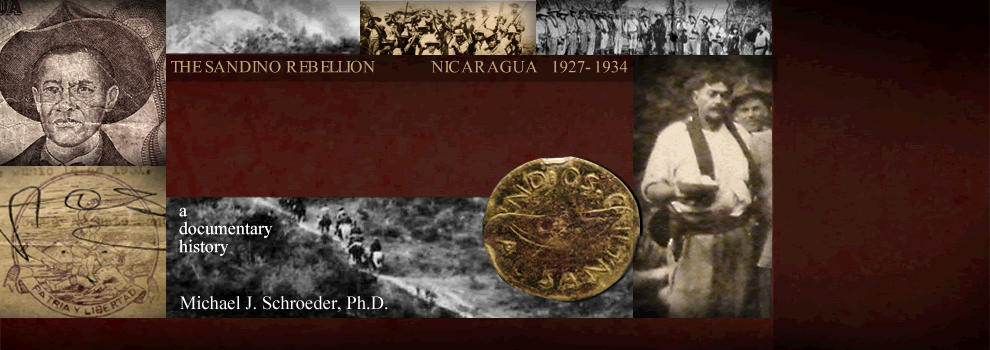|
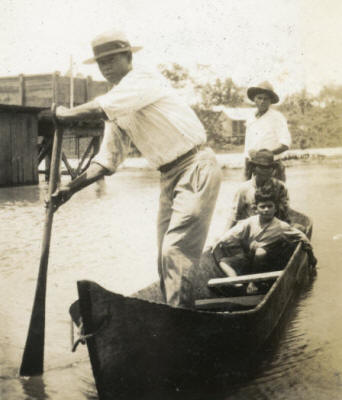 THIS IS THE FOURTH PAGE
of documents for the FIRST HALF of 1929
on Nicaragua's Caribbean Coast, housing materials
dated during the 69 days from April 23 to June 30.
THIS IS THE FOURTH PAGE
of documents for the FIRST HALF of 1929
on Nicaragua's Caribbean Coast, housing materials
dated during the 69 days from April 23 to June 30.
Especially noteworthy here
are the first set of despatches from
British Chargé d’Affaires Stanford
London on “The Mosquito Indian
Question” (May 5), which continue
later on the page (20 & 21 June).
Also significant is the 17 May
report by Colonel John Marston on
the “Reorganization of the Area of
the East,” which can be fruitfully
read alongside new Eastern Area
Commander Major C. H. Metcalf’s
letter to Col. Rhea (31 May).
From these & other reports &
letters, we learn that the Marines
are seriously considering
withdrawing from the entire Eastern
Area — a prospect that does not sit
well with the president of the
Bonanza Mines Company (23 May).
The Bluefields Weekly
continues to express concern about
the region’s economic situation,
while the Marines & Guardia continue
their unsuccessful efforts to locate
& destroy the EDSN bands far in the
interior. By the end of the
period covered on this page, Sandino
has left Nicaragua for Mexico, where
he will remain for a full year.
|
|
PERIOD MAPS
|
|
1894 mosquito
shore

27 MB,
library of congress
|
1920s
Standard Fruit

6.5 mb,
US National archives
|
1928 Rio wanks
Patrol

3 mb, us
national archives
|
1931 Moravian

2.4 mb,
comenius press
|
|
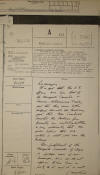
|
1.
5 May 1929.
Miskitu Indian Question,
British Chargé
d'Affaires Stanford London,
Managua, to Mr. Craigie, British Foreign
Office, p. 1.
|
|
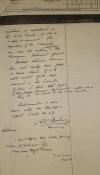
|
2.
5 May 1929.
Miskitu Indian Question,
British Chargé
d'Affaires Stanford London,
Managua, to Mr. Craigie, British Foreign
Office, p. 2.
|
|
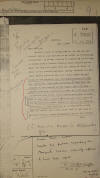
|
3.
5 May 1929.
Miskitu Indian Question,
British Chargé
d'Affaires Stanford London,
Managua, to Mr. Craigie, British Foreign
Office, p. 3.
|
|
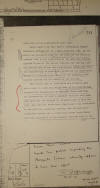
|
4.
5 May 1929.
Miskitu Indian Question,
British Chargé
d'Affaires Stanford London,
Managua, to Mr. Craigie, British Foreign
Office, p. 4.
|
|
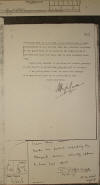
|
5.
5 May 1929.
Miskitu Indian Question,
British Chargé
d'Affaires Stanford London,
Managua, to Mr. Craigie, British Foreign
Office, p. 5.
|
|
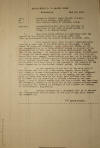
|
14 May 1929.
Recommendation for award for services in
Nicaragua in the case of Major Harold H.
Utley, U. S. Marine Corps, from
Brigadier General
Logan Feland, USMC, to the Major
General Commandant.
|
|
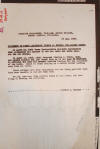
|
17 May 1929.
Statement of 1st Lt. Vernon M. Guymon,
USMC, Aviation Detachment, Puerto
Cabezas.
|
|
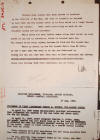
|
17 May 1929.
Statement of Captain Rose
on air patrols
over Rio Grande.
|
|
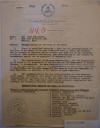
|
1.
17 May 1929.
Reorganization of the Area of the East,
Eastern Area Commander
Col. John
Marston, Bluefields, to Jefe
Director GN, Managua, p. 1.
"1. There is
submitted herewith a plan for the
reorganization of the Area of the East,
to be made effective June 1, 1929, and
carried out as rapidly as recruits can
be trained and sent out to the outlying
stations. From present indications, the
distribution of the Guardia as
recommended herein can be completed by
September 1st. ¶ 2. The establishment of
an Area Headquarters, and two
departments to be known as the
Department of Bluefields and the
Department of Puerto Cabezas, is
recommended. An Area Headquarters has
never been organized. It is now
practically a part of the organization
of the present Department of Bluefields,
and the Area Commander has been in fact
the Commander of that Department in
addition to his duties as Area
Commander. ¶ 3. The recommendations for
the reorganization of this Area are
given below. Throughout this letter the
left hand column shows present
organization and strength (as of May 10,
1929) not including recruits under
training. The right hand column shows
proposed organization and strength not
including recruits under training. ¶
HEADQUARTERS, AREA OF THE EAST, at
Bluefields. ¶ Present organization and
strength – 1 colonel, commanding ¶
Proposed organization and strength – 1
colonel, commanding; 1 major, inspector;
1 major (or captain) medical; 1 captain,
QM, PM, and Disbursing Agent; 1
lieutenant, adjutant; 1 sergeant major;
1 quartermaster sergeant; 1 first
sergeant, medical; 1 sergeant, medical;
1 sergeant, for QM duty; 1 sergeant (or
corporal) for PM duty; 1 corporal, for
QM duty; 2 corporals, medical; 3
privates . . . "
|
|
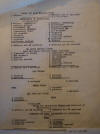
|
2.
17 May 1929.
Reorganization of the Area of the East,
Eastern Area Commander
Col. John
Marston, Bluefields, to Jefe
Director GN, Managua, p. 2.
" . . . Total for
Area Headquarters: ¶ Present
organization and strength – 1 officer ¶
Proposed organization and strength – 5
officers and 17 enlisted ¶ DEPARTMENT OF
BLUEFIELDS, ¶ At Bluefields ¶ Present
organization and strength – 1 captain,
commanding; 1 captain, medical; 1
lieutenant, QM; 1 lieutenant, medical; 1
lieutenant, cadet; 1 1st sergeant; 1
sergeant; 8 corporals; 7 privates; 3
privates, medical ¶ Total present
organization and strength – 5 officers
and 49 enlisted ¶ Proposed organization
and strength – 1 captain, commanding; 2
lieutenants; 1 lieutenant, medical; 1
lieutenant, QM; 1 1st sergeant; 3
sergeants; 8 corporals; 1 corporal,
medical; 46 privates; 2 cornets ¶ Total
proposed organization and strength – 5
officers and 61 enlisted ¶ EL BLUFF
RECRUIT DEPOT ¶ (not including recruits
under training) ¶ Present organization
and strength – 1 lieutenant in charge; 1
1st sergeant; 1 private; 1 private,
medical ¶ Total present organization and
strength – 1 officer and 3 enlisted ¶
Proposed organization and strength – 1
lieutenant in charge; 1 lieutenant,
medical; 1 1st sergeant; 1 sergeant; 1
corporal; 1 corporal, medical, 3
privates ¶ Total proposed organization
and strength – 2 officers and 7 enlisted
¶ LAS PERLAS ¶ Present organization and
strength – 1 corporal; 2 privates ¶
Total present organization and strength
– 3 enlisted ¶ Proposed organization and
strength – 1 corporal, 7 privates ¶
Total proposed organization and strength
– 8 enlisted ¶ PUNTA GORDA ¶ Present
organization and strength – NONE ¶
Proposed organization and strength – 1
corporal, 3 privates ¶ 4 enlisted ¶ SAN
JUAN DEL NORTE ¶ Present organization
and strength - 1 corporal; 2 privates ¶
Total present organization and strength
– 3 enlisted ¶ Proposed organization and
strength – NONE ¶ Total for Bluefields
Hdqtrs and District of Bluefields ¶
Present organization and strength – 5
officers and 58 enlisted ¶ Proposed
organization and strength – 7 officers
and 80 enlisted ¶ DISTRICT OF RAMA,
DEPARTMENT OF BLUEFIELDS ¶ RAMA ¶
Present organization and strength – 1
lieutenant; 1 corporal, medical; 6
privates ¶ Proposed organization and
strength – 1 lieutenant; 1 sergeant; 2
corporals; 1 corporal, medical; 17
privates . . . "
|
|
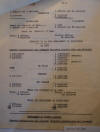
|
3.
17 May 1929.
Reorganization of the Area of the East,
Eastern Area Commander
Col. John
Marston, Bluefields, to Jefe
Director GN, Managua, p. 3.
" . . . Total
present organization and strength - 1
officer and 7 enlisted ¶ Total proposed
organization and strength – 1 officer
and 21 enlisted ¶ GUADALUPE ¶ Present
organization and strength – 2 privates ¶
Total present organization and strength
– 2 enlisted ¶ Proposed organization and
strength – 1 corporal; 3 privates ¶
Total proposed organization and strength
– 4 enlisted ¶ Total for district of
Rama ¶ Present organization and strength
– 1 officer and 9 enlisted ¶ Proposed
organization and strength – 1 officer
and 25 enlisted ¶ DISTRICT OF LA CRUZ
DEPARTMENT OF BLUEFIELDS ¶ LA CRUZ ¶
Present organization and strength – 1
lieutenant; 1 sergeant; 6 privates ¶
Proposed organization and strength – 1
lieutenant; 1 lieutenant (medical) 1
sergeant; 2 corporals; 1 corporal
(medical); 17 privates ¶ EL GALLO ¶
Present organization and strength –
NONE; ¶ Proposed organization and
strength – 1 corporal; 7 privates ¶
TUMARIN ¶ Present organization and
strength – 2 privates ¶ Proposed
organization and strength – 1 corporal;
3 privates ¶ RIO GRANDE ¶ Present
organization and strength - 1 sergeant;
3 privates ¶ Proposed organization and
strength – 1 sergeant; 7 privates ¶
TOTAL FOR DISTRICT OF LA CRUZ ¶ Total
present organization and strength – 1
officer, 13 enlisted ¶ Total proposed
organization and strength – 2 officers,
41 enlisted ¶ TOTAL FOR DEPARTMENT OF
BLUEFIELDS ¶ Present organization and
strength – 8 officers, 80 enlisted,
total – 88 ¶ Proposed organization and
strength – 10 officers, 146 enlisted,
total – 156 ¶ DEPARTMENT OF PUERTO
CABEZAS . . . "
|
|
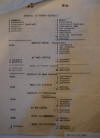
|
4.
17 May 1929.
Reorganization of the Area of the East,
Eastern Area Commander
Col. John
Marston, Bluefields, to Jefe
Director GN, Managua, p. 4.
" . . . (HDQTRS.
AT PUERTO CABEZAS) ¶ Present
organization and strength – 1 captain; 1
lieutenant; 1 lieutenant (medical); 1
sergeant; 2 corporals; 8 privates ¶
Proposed organization and strength – 1
major; 1 lieutenant; 1 lieutenant
(medical); 1 lieutenant (QM); 1 1st
sergeant; 2 sergeants; 6 corporals; 1
corporal (medical); 38 privates; 2
cornets ¶ RECRUIT DEPOT. (tentative) ¶
Present organization and strength –
NONE. ¶ Proposed organization and
strength – 1 lieutenant; 1 1st sergeant;
1 sergeant; 1 corporal; 2 privates ¶ AT
WAWA CENTRAL ¶ Present organization and
strength – 1 sergeant; 4 privates ¶
Proposed organization and strength – 1
sergeant; 8 privates ¶ TOTAL AT PUERTO
CABEZAS ¶ Present organization and
strength – 3 officers; 16 enlisted ¶
Proposed organization and strength – 5
officers, 64 enlisted ¶ DISTRICT OF GABO
CRACIAS ¶ Present organization and
strength – NONE. ¶ Proposed organization
and strength – 1 lieutenant; 1 sergeant;
1 corporal; 12 privates ¶ TOTAL FOR
DISTRICT ¶ Present organization and
strength – NONE. ¶ Proposed organization
and strength – 1 officer; 14 enlisted ¶
DISTRICT OF PRINZAPOLKA ¶ Present
organization and strength – NONE. ¶
Proposed organization and strength – 1
lieutenant; 1 sergeant; 1 corporal; 12
privates ¶ AT WALPASICRA ¶ Present
organization and strength – NONE. ¶
Proposed organization and strength – 1
corporal; 3 privates ¶ TOTAL FOR
DISTRICT ¶ Present organization and
strength – NONE. ¶ Proposed organization
and strength – 1 officer; 18 enlisted ¶
TOTAL FOR DEPARTMENT ¶ Present
organization and strength – 3 officers;
16 enlisted ¶ Proposed organization and
strength – 7 officers; 96 enlisted . . .
"
|
|
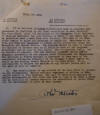
|
5.
17 May 1929.
Reorganization of the Area of the East,
Eastern Area Commander
Col. John
Marston, Bluefields, to Jefe
Director GN, Managua, p. 5.
" . . . TOTAL FOR
AREA ¶ Present organization and strength
– 11 officers; 96 enlisted ¶ Proposed
organization and strength – 21 officers,
151 enlisted ¶ 4. It is believed that
above distribution both in location and
personnel is justified by the local
conditions in each district. The Coco
River, until the extension of the
Bragmans Bluff Railroad to Waspook
[Huaspuc] the construction of which is
now under way, can be patrolled once a
week from Cabo Gracias. The area in the
Coco River region is quiet and promises
to remain so. Garrisons at La Cruz and
Rama are increased to afford better
protection along the Escondido and
Grande Rivers. The Guardia should be
able to relieve the Marines of further
duty at El Gallo as soon as the proposed
detachment can be sent to that place.
The Prinzapolka region has no Guardia at
present. The new station proposed should
afford adequate protection to the
regions about Prinzapolka and
Walpasisca. A garrison at Puerto Cabezas
is increased to take care of the
constantly increasing extension of the
Bragman’s Bluff Lumber Company which is
now working toward Waspook in the Coco
River. It is contemplated to relieve the
marines of any further police duty in
the Area as soon as possible. ¶ 5. The
establishment of any station in the Coco
River at present is not recommended.
Marine officers cognizant of affairs in
this region concur in this opinion. The
cost of furnishing supplies to Marine
detachments on this river had been as
high as 13 cents a pound and no
conditions at present warrant the
expenditure of public funds for the
maintenance of posts on this stream. ¶
Colonel John Marston"
|
|
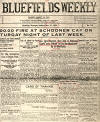
|
18 May 1929.
"Col. John Marston, new Chief of
National Guard, pays Official visit to
the Municipality of Bluefields,"
The
Bluefields Weekly, p. 1.
|
|
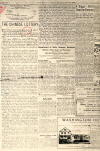
|
18 May 1929.
The Bluefields Weekly, p. 2.
|
|
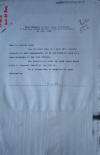
|
21 May 1929.
Memo from 1st Lt.
W. C. Hall, Puerto Cabezas, to
Capt. Rose, Puerto Cabezas, p. 1.
"The
attached copy of a memo from Captain
Linscott [below] is self explanatory, as
is the attached copy of a memo addressed
to the boat officer. The description
given by these women might apply to
Corporal Arnold of the 59th Co. This
information is supplied for your
information."
|
|
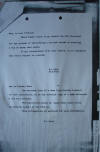
|
21 May 1929.
Memo from 1st Lt.
W. C. Hall, Puerto Cabezas, to
Capt. Rose, Puerto Cabezas, p. 2.
"Memo to boat
officer [from Capt. Linscott]: These
women desire to go aboard the USS
Cleveland for the purpose of identifying
a marines acused [sic] of stealing a sum
of money last night. If not inconsistent
with your orders, it is requested that
their request be granted."
|
|
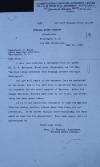
|
23 May 1929.
Letter from
Benjamin C. Warnick, President,
Bonanza Mines Company, Bluefields,
Nicaragua, C.A. via New Orleans, La., to
Department of State, Latin American
Division, Washington D.C.
"Dear Sirs: I
have just received a cablegram from our
agent Mr. H. F. Springer, Bluefields,
Nicaragua, as follows: 'Marines being
withdrawn from Bonanza protest strongly
Washington.' You are well aware of the
enormous loss we sustained at our mines,
due to the fact that no attention was
paid to our requests for the moral
support of Marines. After the damage was
done, Marines were sent to the mines,
and everything has been quiet since. If
it is not absolutely necessary to take
the Marines from the mining section,
please keep them there for our
protection. If we suffer through there
withdrawal for whom shall we look for
protection. Your kind reply, will be
appreciated by, Yours very truly, Benj.
C. Warnick, President, Bonanza Mines
Company."
|
|
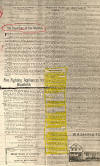
|
25 May 1929.
"The Departure of the Marines,"
The
Bluefields Weekly.
|
|
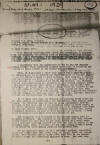
|
31 May 1929.
Letter from Major
Clyde H. Metcalf, Puerto Cabezas,
to Col. R. Y. Rhea, Managua, p. 1.
"I am sending
under separate cover, and officially, a
proposed plan for occupying the Eastern
Area of Nicaragua with our reduced
strength. As a supplement, I am taking
the liberty to point out a few other
changes which might be made provided
political and other pressure can be
overcome. ¶ I understand that the
occupation of the La Luz and Neptune
mining area is being continued largely
on account of political influence of
their owners in the States and
elsewhere. ¶ While in Bluefields a short
time ago, I had a long talk with Dr.
Marchand who is at present the
representative of the Los Angeles and La
Luz Mining Company in this country. That
company, I believe, owns practically all
claims in the vicinity of La Luz, which
is now being guarded by a detachment of
thirty six Marines. Dr. Marchand told me
that practically all property of that
mining company, except a few small
buildings which could be destroyed, has
already been destroyed. He stated that
the only damage which the natives or
anyone else could do would be to work
the gold claims and take such gold as
they could get by hand process. Captain
Linscott who returned from the command
of that area about two weeks ago,
reported that conditions are
substantially the same as given above. ¶
So it would seem that the Marines are
guarding these mines for the sole
purpose of preventing a few individuals
from working these claims. Dr. Marchand
told me that he would communicate with
Mr. Fletcher of New York, who is the
principal owner of these mines, to see
if Mr. Fletcher would be satisfied for
us to withdraw from there and not use
further political pressure through his
brother, former Ambassador Fletcher, to
keep us from pulling out of there. I
have heard nothing in connection with
this matter so far. ¶ The situation with
reference to the Neptune mining area is
slightly different. The crushers at the
Bonanza Mine were wrecked beyond repair
and that mine is now being worked on a
small scale with a modified crushing
process and with the idea of making it
pay expenses only. That, I believe, is
the only mining actually going on in
either of those mining areas at the
present time. ¶ As you doubtless know,
it is a difficult problem, especially
after our planes have been taken away,
to supply these two detachments. Boat
transportation alone costs from five to
six hundred dollars a month for
forwarding supplies to them. The boat
trip . . . "
|
|
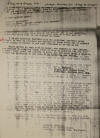
|
31 May 1929.
Letter from Major
Clyde H. Metcalf, Puerto Cabezas,
to Col. R. Y. Rhea, Managua, p. 2.
"[ . . . ]
sacrifice to the Marines and to the
Government to continue guarding these
mining areas when so little good is
apparently being done by the Marines up
there. ¶ I am not entirely familiar with
the political pressure being brought to
bear to maintain the Marines in these
Areas but it appears to me highly
desirable to get them withdrawn if we
can do so. ¶ Major Bourne is over with
me today, and assured me that Brigade
was anxious to evacuate these areas as
soon as possible and for that reason I
have taken the liberty to write you the
above which I believe covers the
situation to the best of my knowledge
and belief."
|
|
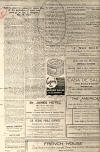
|
1.
1 June 1929.
The Bluefields Weekly, p. 1.
"OLD GLORY
removed to the Bluff ¶ For several
months past the sight of the American
and Nicaraguan flags flying in the
Palace yard has not failed to arrest the
attention of the most casual observer
who has had occasion to pass the Palace.
A few mornings ago, on walking past the
parade ground, one observed that
something was lacking from the
accustomed view of things. What was
wrong? The American flag had been
removed, and had been taken by the
marines to their new quarters at the
Bluff. So great is the sentiment
attached to a national emblem that one
cannot help becoming attached in some
way or other to a flag that one has seen
for months, even though it be a foreign
one. Without disrespect or disloyalty to
our own flag we say that OLD GLORY will
be missed for some time to come."
|
|
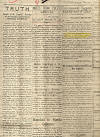
|
2.
1 June 1929.
The Bluefields Weekly, p. 2.
"NOTES FROM
PUERTO CABEZAS ¶ May 19,1929. ¶ Cpl.
John P. Meshkoff, Pvt. Sgt. Departs. ¶
The genial Corporal departs this evening
for his happy home at Rockford,
Illinois, leaving behind a bunch of
friends, who deplore his unexpected
separation from our midst. ¶ His amiable
and refined manners during his eight
months sojourn in this community, gained
him the good will and appreciation among
all classes who came in contact with
this worthy representative of order and
justice. We entertain the hopes, that we
may again have the pleasure to greet him
within an early future. ¶ We cherish the
confidence that the great land of his
birth stores for him and his dear ones
endless happiness in reward for his
undisputed merit. ¶
CORRESPONDENT
SUGGESTS ESTABLISHMENT OF SCHOOL.¶
Prinzapolka, May 28th 1929 ¶ Mr.
Editor,¶ I understand that the Minister
of Public Instruction is about to arrive
in your city. Don’t you think that it
would be advisable to suggest the
establishment in that place of a mixed
school, comprised of say 25 boys from
each of the four groups that form the
population of this Coast—Spaniards,
Creoles, Mosquitos, and Sumus? These
boys should be from 12 to 15 years of
age, picked for their physical and
mental fitness, and should be given 4
years training, all their expenses being
defrayed by the Government. These pupils
would teach in their respective
communities for an equal term. I know
of(a) man who would be a valuable
acquisition for said school, Mr. Robert
Grey, who knows thoroughly the two
languages and two dialects. ¶
Respectfully yours, Enrique Espinoza."
|
|
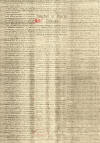
|
3.
1 June 1929.
The Bluefields Weekly, p. 3. "BASEBALL
IN PUERTO CABEZAS ¶ Sandoval’s Strong
arm harasses Sturdy U.S. Marines.
Yanshank the Modest Hurls great game for
victims. Boers foil Marines in
Sensational Scrap 4-1. Stellar coop of
fly in center field by Osejo the
sensation of the day. ¶ By J.M.
Guido. Puerto Cabezas May 19, 1929. ¶
Beneath a most attractive lapis blue
sky, enjoyed but in this land of
perpetual summer and embellished with
tints of rose, the eager fans were
treated to one of the most artistic
performances viewed under the southern
heavens this beautiful Sunday afternoon,
put up by adroit Marines vs plucky Boers
at Bragmans’ Field. ¶ From early and
prior to the frantic ravel, the cheering
crowd vegan to congregate at the
baseball mecca, the Stadium, to see the
great exhibition on the diamond. Uncle
Sam’s worthy representative showed up in
due time going thru formal warming up;
moments later the Spanish tribe
following similar tactics. After the
usual preliminaries, the Leathernecks
defiantly hooked the hickory, starting
the ball a–rolling And looting their
only skid in the first stanza. This
ended their run-getting ability, for
from here on Sandoval and destiny
ordained it otherwise. Modest Yanshak’s
phenomenal out-shoots, baffled the evil
purpose of the Spanish adversary, which
held it at bay from the third inning
when Foxy Kowalak was retired to the
bench when his efficiency on the mound
was discovered by the opponents, causing
three tallies to be recorded against his
flock in first two merry-go-rounds. ¶
Not till the eighth frame did the Boers
score again, pilfering one more run,
thus feathering their nest and gliding
on listless wings. The stars began to
glow and away flew these happy ducks to
revel over the day’s events, whilst the
duped genteel Leathernecks still ponder
in amazement over the gloomy results of
the titanic feat. Another ball gone
to….(You know where)"
|
|
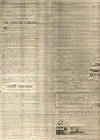
|
1.
8 June 1929.
The Bluefields Weekly, p. 1.
"Re: the
National Guard ¶ Lieut. W.J.
Stone left for Rama on Tuesday the 11th
inst. to take over the command of
National Guard stationed there from
Lieut. Alex Medley. ¶ Lieut. Stone had
been in charge of the Recruit Depot at
the Bluff. ¶
GUARDIA NACIONAL AS
PROTECTORS OF THE CIVILIANS ¶
Puerto Cabezas ¶ 1. On the night of 28
May, 1929, several shots were fired by
some unknown person. Within five
minutes, the Guardia Nacional force on
duty, in command of Major H.D. Linscott,
in command of the Guardia Nacional at
Puerto Cabezas, and Lieutenant Joseph
Savoie, Medical Corps, Guardia Nacional,
were on the scene and immediately took
charge of the necessary investigation
and restored order in a decidedly short
space of time. It is with pleasure that
we state we are proud of our Guardias at
Puerto Cabezas. It is brought to the
attention of all, that given a medical
Officer was present to render medical
assistance if required. About one half
hour after the Guardia had the situation
in hand the Marine Guard arrived and
reported for duty, but the services of
the Marines were not required, as the
Major in command of the Guardia had
already settled the affair in a manner
satisfactory to all. ¶ 2. The Guardia
Nacional is recruiting in Puerto
Cabezas, and is taking only such men as
show promise of good behavior and are in
possession of a fairly good education.
Many recruits have to be rejected for
various reasons, principally
educational. Very few medical rejections
are on record. Recruits who are accepted
for service now, will be given training,
including an instruction in general
education, police regulations, drill,
and the instruction in personal hygiene,
which will be a good grounding for the
future of the man concerned. In addition
the recruits are given excellent food,
clothing, and free medical attention,
and are placed in hospital if necessary,
all free of charge. The pay of privates
in the Guardia is twelve dollars
monthly, the pay of corporals eighteen
dollars monthly, and the pay of
sergeants 25 dollars monthly, with no
expenses, and the chances of promotion
depends on the man himself. Good
behavior and attention to duties are the
biggest factor in promotion of the men."
|
|

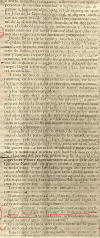
|
2.
8 June 1929.
The
Bluefields Weekly, p. 2. (2
images).
"Por la
Moralidad Pública.
Nuestra mesa de redacción, diferentes
estimables personas de nuestra sociedad,
a suplicarnos que digamos o hagamos
algo, para ver de conseguir que los
Jefes de La Guardia nacional, se dignen
dedicar un poco mas de atención al
mejoramiento moral de la Guardia bajo su
mando, a fin de poner coto al
desbordamiento de indecorosas y
desordenadas pasiones y a tanta
inmoralidad por ellos cometidas y que ya
están hartos de presenciar. ¶ Desde las
seis de la tarde y muchas veces durante
el día, se da principio sobre la calle
de “Patterson”, en la parte más central
de la ciudad, a una serie de bailes, en
ciertas cantinas que por allí í existen
y que son frecuentadas por mujeres de
vida licenciosa, en compañía de los
guardias, quienes en vez de dedicarse a
cumplir con los deberes de su cargo,
llegan a formar, junto con ellas, los
mayores escándalos. ¶ A cada momento se
ven dentro de las referidas cantinas, en
los corredores de las mismas, en la
calle mencionada y en las adyacentes,
cuadros inmorales en sumo grado, capaces
de hacer ruborizarse a los mas
despreocupados. ¶ El tener que decir que
los principales autores de semejante
inmoralidad, son los guardias, quienes
amparados en la impunidad, por la
seguridad que tiene de que no se les
vigila y de que nadie es capaz de
denunciarlos por el temor que se les
tiene en todas partes; en vez de servir
ellos de salvaguardia a los ciudadanos y
ser los sostenedores de las
instituciones de la República, se han
convertido en verdadera amenaza. ¶
Cansado el vecindario honrado de la zona
comprendida en la parte infestada de la
ciudad, a que venimos refiriéndonos, han
llegado a suplicarnos digamos algo de
todo esto, para ver si es posible poner
coto a tanta informalidad y tanto
escándalo; y nosotros a nuestra vez
haciéndonos eco de los clamores del
pueblo pedimos a las Autoridades
superiores y muy especialmente al señor
jefe de la Guardia Nacional, de quien
estamos seguros ignora todas estas
irregularidades, ponga un pronto y
eficaz remedio a este mal, que tanto
daño causa a esta sociedad que esta bajo
su salvaguardia, como jefe superior de
La Guardia Nacional, que ha sido creada
con este fin. ¶ Tenemos fe en que se nos
atenderá y se hará justicia. ¶ Nuestro
corresponsal de Puerto Cabezas,
refiriéndose a la Guardia Nacional de
aquel lugar dice entre otras cosas lo
siguiente: ¶ “Actualmente están dándole
instrucción civil, militar y moral a una
falange de indios y criollos
nicaragüenses. Aquí todas las
actividades de los guardias son dignas
de aplaudirse”. ¶ Cuándo podremos decir
otro tanto de la guardia nacional de
esta ciudad? ¶ Esperamos poder
consignarlo muy pronto en nuestras
columnas."
|
|
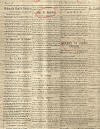
|
3.
8 June 1929.
The Bluefields Weekly, p. 3.
|
|

|
1.
20 June 1929.
Cable from
British Chargé d'Affaires Stanford London, Managua, to British Foreign
Office, London, re Miskitu Indian
Petition, p. 1.
"The Minister for
Foreign Affairs asked me to go and see
him this afternoon and then handed me
the annexed document, which, he said, is
a copy of a circular which has been sent
to all the Indiana villages on the
Mosquito Coast. ¶ 2. His Excellency drew
my attention to the fact that it
purports to be signed by one Philemon
Jackson, who describes himself as
‘Representative of the Indians appointed
by the British Consul and the Indian
League’, and said that the President has
received reports to the effect that H.
M. Consul at Bluefields has been
inciting Jackson and other Indians to
complain of the conditions on the Coast
and I in particular to take the action
indicated in the circular. He had,
however, the grace to add that they did
not know whether the reports were
trustworthy. ¶ 3. I at once said that I
was quite convinced that the reports
were absolutely unfounded, and that Mr.
Rees had not and would not do anything
of the kind. Further, I did not for one
moment believe that Mr. Rees knew
Jackson was describing himself as
‘Representative appointed by the British
Consul’, still less that he had done or
said anything which could be interpreted
as authorizing the use of such a
description. Nevertheless I would write
and ask him for a report and would let
his Excellency know the result in due
course. ¶ 4. I then went on to say that
my visit to the Coast last November had
shown me very clearly that there is and
has long been a great deal of discontent
among the Mosquito Indians who feel that
the Nicaraguan . . . "
|
|
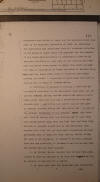
|
2.
20 June 1929.
Cable from
British Chargé d'Affaires Stanford London, Managua, to British Foreign
Office, London, re Miskitu Indian
Petition, p. 2.
" . . .
Government has failed to carry out the
promises which they made in the Mosquito
Convention of 1894. In particular the
Government had undertaken that all
revenues collected on the Mosquito Coast
should be expended for the benefit of
the Coast; that, according to
information given as by American
Presidents in that part of the country,
the revenues collected there amount to
about five times as much per head of
population as those collected in Western
Nicaragua, and the Coast feels that it
receives absolutely nothing in return. I
instanced in particular the lack of
schools and of means of communication. ¶
5. Reverting to Jackson’s circular I
drew His Excellency’s attention to the
date, April 2nd last. Mr. Inspector
General Dunlop visited Bluefields about
a fortnight after that and then had a
conversation with Mrs. Crowdell, who –
apart from the active support she gave
to General Moncada during the late civil
war – is one of the keenest champions of
the Indians’ cause. Mrs. Crowdell told
Mr. Dunlop that the Indians had of late
been more discontented than ever and
that they had been very anxious to
present a petition to the President.
She, however, felt that the petition was
ill-advised and had persuaded them to
drop the idea (see my letter of May 5th
last to Mr. Craigie). It seemed to me
very possible that she was referring to
Jackson’s activities and that the matter
has now been dropped. ¶ 6. Dr. Cordero
Reyes replied that he was very glad
indeed to know my opinion of Mr. Rees
and thanked me for my promise to ask him
for a report. ¶ 7. He then said that the
President has instructed . . . "
|
|
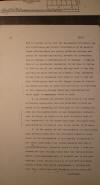
|
3.
20 June 1929.
Cable from
British Chargé d'Affaires Stanford London, Managua, to British Foreign
Office, London, re Miskitu Indian
Petition, p. 3.
" . . . him to
explain to me that the Nicaraguan
Government cannot countenance any direct
intervention by Mr. Rees in these
matters; these are purely political
matters and should be treated
exclusively between the Government and
his Majesty’s Representative in Managua.
I replied that it is manifestly
impossible for Mr. Rees to refuse to
talk to any of the Indians who may come
to see him, and that as minor matters of
a purely local character he may find it
necessary from time to time to see the
Jefe Politico; but that on the larger
issues he limited and would continue to
limit his activities to reporting in
this Legation, through which any
representations which might be necessary
would be made. ¶ 8. As regards the
general conditions on the Coast Dr.
Cordero Reyes said that the President is
most anxious to do something for that
part of the country, but that for the
moment there is one inseparable
obstacle, lack of money. He hopes to be
able to devote some of the ‘superavit’
to the Coast next year. His Excellency
authorized me to mention this in my
letter to Mr. Rees. ¶ 9. In the course
of the conversation His Excellency said
several times that the President hoped
he could count on the cooperation of His
Majesty’s Legation in all these
questions. I of course assured him that
I would do everything I properly could
to help. I then reminded him (for the
nth time) that the various Notes which I
had addressed both to himself and to his
predecessor about Article 111 (a) of the
Harrison-Altamirano Treaty were still
unanswered. I pointed out that this
matter has been dragging on for years
and . . . "
|
|
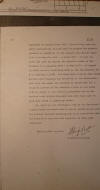
|
4.
20 June 1929.
Cable from
British Chargé d'Affaires Stanford London, Managua, to British Foreign
Office, London, re Miskitu Indian
Petition, p. 4.
" . . . expressed
my earnest hope that I should very soon
receive satisfactory replies both as
regards the general questions of
exemption of the Indians from direct
taxation (P.O. despatch No. 25 – A
3135/12/8 – of July 13, 1928) and also
as regards the specific cases of Mrs.
Crowdell (P.O. despatch No. 37 – A
5561/12/8 – of August 18, 1928) and the
Bluefields Charity Tax (my despatch No 9
of February 2, 1929. His Excellency
replied that these matters were engaging
the attention of the Government; that
they had asked the Governor of
Bluefields for a detailed picture of the
taxation levied on the Coast both on
behalf of the central government and by
the various local authorities, and that
when that came to hand they hoped to
answer my notes. ¶ 10. Later in the
afternoon I was at the President’s
country house and mentioned to him my
conversation with the Foreign Minister,
assuring him of my conviction that the
reports he had received regarding Mr.
Rees were unfounded. ¶ Managua, June 20,
1929. ¶ H. Stanford London"
|
|
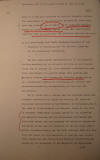
|
1.
21 June 1929.
Cable from
British Chargé d'Affaires Stanford London, Managua, to British Foreign
Office, London, re Miskitu Indian
Petition submitted to Mrs. Anna Crowdell
(but never formally submitted to British
Gov't), p. 1.
"Copy of a
Petition prepared by certain Mosquito
Indians for submission to the Nicaraguan
Government. This document was given by
Mrs. Crowdell to Mr. Inspector General
Dunlop at Bluefields on May 2nd, 1929.
She then stated that the idea of
presenting the petition had been
dropped. ¶ To His Excellency Jose Maria
Moncada, President of the Republic of
Nicaragua, and the National Assembly of
the Nicaraguan Government. ¶ We the
undersigned representatives of the
Mosquito Indians, residing on the
Mosquito Literal, do now respectfully
beg to present for your esteemed
consideration and final adjustment of a
matter which very gravely and solemnly
affects our country, the Mosquito Coast,
and we as a people, our rights, our
privileges, our liberty and advancement,
socially, educationally, religiously and
politically. ¶ Be it known that a solemn
law and covenant named the Mosquito
Convention by which our country, the
Mosquito Coast, was incorporated in the
Republic of Nicaragua, was at the town
of Bluefields, on the Mosquito Coast, on
the 29th of November 1894, drawn up,
made, agreed to and signed by the
Mosquito Indians and the Nicaraguan
Government, and that said solemn law and
covenant the Mosquito Convention was
given in the Hall of Sessions of the
National Legislative Assembly, Managua,
on the 27th February 1895, and also that
the order for the execution of putting
into effect this solemn law and
covenant, the Mosquito Convention, was
signed by the President of the Republic,
His Excellency . . . "
|
|
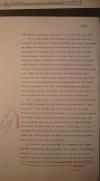
|
2.
21 June 1929.
Cable from
British Chargé d'Affaires Stanford London, Managua, to British Foreign
Office, London, re Miskitu Indian
Petition submitted to Mrs. Anna Crowdell
(but never formally submitted to British
Gov't), p. 2.
" . . . Jose
Santos Zelaya at Managua on the 29th
February 1895. ¶ Be it also known that
whereas this solemn law and covenant,
the Mosquito Convention, which was drawn
up, agreed to, sworn to and signed by
the Mosquito Indians and the Nicaraguan
Government with the sole purpose and
mutual understanding that a glorious
future was in store for them, the
Mosquito Indians, and their country, the
Mosquito Coast, deriving therefrom great
benefits of freedom, education, justice,
protection and general attachment, has
not been fulfilled by the Nicaraguan
Government, but this solemn law and
covenant, the Mosquito Convention, has
been entirely disregarded, ignored and
cast aside by the Nicaraguan Government
and that said Nicaraguan Government has
failed entirely to carry into effect the
decree of this solemn law and covenant,
the Mosquito Convention. ¶ Be it known
that in consequence of the
non-fulfillment and utter disregard by
the Nicaraguan Government of the decree
of this solemn law and covenant, the
Mosquito Convention, we the Mosquito
Indians so now solemnly desire that this
document, Mosquito Convention, become
null and void and that the act of
incorporation is annulled; and we
further declare that we required
absolutely no readjustment to this
document the Mosquito Convention, but
now claim our former rights to
self-government and independence
politically and economically. ¶ We
further beg to inscribe out comments and
observations respecting this document
the Mosquito Convention, showing to the
world our reasons for the steps we the
Mosquito Indians have now taken. We
Indians have waited for 34 years for the
fulfillment of these solemn promises . .
. "
|
|
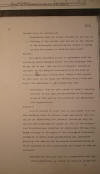
|
3.
21 June 1929.
Cable from
British Chargé d'Affaires Stanford London, Managua, to British Foreign
Office, London, re Miskitu Indian
Petition submitted to Mrs. Anna Crowdell
(but never formally submitted to British
Gov't), p. 3.
" . . . Preamble,
from the Convention:- ¶ ‘Considering
that the change effected on the 13th of
February of the current year was due to
the efforts of the Nicaraguan
authorities, who wished to redeem us
from the slavery in which we were found’
¶ Comment. ¶ This above statement is not
in accordance with the conditions which
obtained before the 13th February 1894.
We may and do ask – Who had us, the
Mosquito Indians, in slavery? We the
Mosquito Indians, from as far back as
1660 A.D. as history records, were
always a free people. We were ruled by
our kings and chiefs, living a free and
happy life according to our customs and
laws. ¶ ‘Considering that we have agreed
to submit ourselves entirely to the laws
and authorities of Nicaragua, so as to
form part of the political and
administrative organization.’ ¶
Comment:- ¶ This we presume to state
that in accordance with the then
existing state of affairs these
agreements were forced on our
forefathers, the Mosquito Indians, as
they the Indians were powerless to
oppose the will of the Nicaraguan
Government, and therefore we practically
through fear, being entirely in the
power of the Nicaraguan Government,
compelled to comply with any statements
and agreements purported and made by the
Nicaraguan Government, being in total
ignorance of the consequences and issues
of such an agreement. ¶ ‘Considering
that the lack of a respectable and
legitimate government is always the
cause of calamities . . . "
|
|
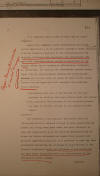
|
4.
21 June 1929.
Cable from Mr.
Stanford London, British Chargé
d'Affaires, Managua, to British Foreign
Office, London, re Miskitu Indian
Petition submitted to Mrs. Anna Crowdell
(but never formally submitted to British
Gov't), p. 4.
" . . . to a
people, in which state we have been so
long.’ ¶ Comment:- ¶ Again that
statement seems prepositioned and could
not be said that it is an authentic
statement which animated from the
thinking faculties of our forefathers,
for the Mosquito Government was
legitimate and respectable like any
other Government, which caused no
calamities to its people. There was no
tyranny, no extortion, no injustice, no
imposition. The Indians our forefathers
enjoyed peace. There were no
revolutions, no chasing and catching and
forcing men to hold arms. No dread of
their houses being entered and pillaged
and their innocent and powerless women
ravished. ¶ ‘Considering that one of the
motives of our backwardness in which we
live was without doubt the having
misappropriated the revenues of the
Mosquitos, investing them in manners
foreign to good administrative order.’ ¶
Comment:- ¶ The revenues of the Mosquito
Government were not ‘misappropriated in
manners foreign to good administrative
order’, for things were done under the
same principle of laws and regulations
as of the British Government, and
besides the Indian delegates, who signed
this document, the Mosquito Convention,
were not in a position to make any such
statements concerning the disposal of
the revenues of the Mosquito Government
being not officers of the Government who
were fully acquainted with the
disbursements of the finances of their
country . . . "
|
|
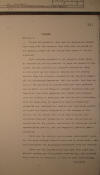
|
5.
21 June 1929.
Cable from
British Chargé d'Affaires Stanford London, Managua, to British Foreign
Office, London, re Miskitu Indian
Petition submitted to Mrs. Anna Crowdell
(but never formally submitted to British
Gov't), p. 5.
" . . . DECREES.
¶ Article 2. ¶ We ask the question, What
has the Nicaraguan Government done with
the revenues that have been collected on
the Mosquito Coast for the thirty-four
years of its occupation? ¶ ‘All revenues
produced on the Mosquito Coast shall be
inverted in its own benefit’ so says the
decree of the solemn law and covenant,
the Mosquito Convention. What benefits
have we the Mosquito Indians and our
country derived from the revenues
produced on the Mosquito Coast? Let the
Nicaraguan Government tell the world.
What has become of the millions of
dollars that have been produced and
collected on the Mosquito Literal?
Revenues from customs, from fines, from
mahogany, from rubber, from bananas,
from the killing of cows, pigs and
turtles, from gold mines, from the
denouncing of lands, from marriage fees,
from passports, etc. Revenues are used
by all legitimate governments, who are
deeply interested in the welfare of the
country and its people over which they
rule, for constructing roads, for
education, for postal facilities, for
sanitation, for the general improvement
of towns, for better communication and
for just and impartial judicial
administration. ¶ Where are the schools
and colleges established? Where are the
post offices? There is only in in
Bluefields – and that was before the
Nicaraguan Government took the country.
¶ Where are the improvements that have
been made? Our beloved country has
retrograded considerably. Our children
have received no education. In fact we
have been walking . . . "
|
|
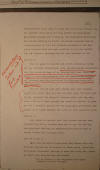
|
6.
21 June 1929.
Cable from
British Chargé d'Affaires Stanford London, Managua, to British Foreign
Office, London, re Miskitu Indian
Petition submitted to Mrs. Anna Crowdell
(but never formally submitted to British
Gov't), p. 6.
" . . . backwards
for these last 34 years and now we the
Indians are one hundred times worse off
than before the Nicaraguan Government
assumed our rulership. The Nicaraguan
Government has failed entirely to
fulfill its solemn promise and
allegiance, that is ‘all the revenues
produced on the Mosquito Literal’ have
not been inverted in its own benefits
and our economic autonomy has not been
reversed to us. ¶ Article 3. ¶ This is
again an ignored and broken promise, a
solemn law and covenant disregarded.
Will the Nicaraguan Government tell the
world how many of us Indians have been
taken and forced to bear arms, carrying
guns and ammunitions, digging war
trenches, carrying provisions for the
army, doing military service? ¶ Yes, the
Indians have been chased down like
rabbits, caught and forced into military
service. Many too have died in war.
Remember the Mosquito Indians never made
any war, never rose to up in arms
against any people or nation. We were
and are a peaceful people, but the
Nicaraguan Government has taught us to
fight against our wills to shed innocent
blood. ¶ Article 4. ¶ Here again we
declare that this solemn law has been
violated for we the Indians have had to
pay for killing cows, pigs, and turtles,
for passports, five, ten, fifteen to
twenty dollars for marriage fees. ¶
Article 6 and 7. ¶ Where are the Chief
Inspectors? The Decree says only
Mosquito Indians may be elected to these
posts. Would the Nicaraguan Government
mention by name and state the places at
which they were and are stationed? ¶ (To
be signed by the delegates from each
Mosquito Indian village.)"
|
|
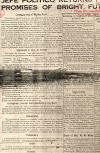
|
1.
22 June 1929.
The Bluefields Weekly, p. 1.
|
|
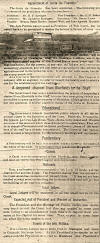
|
2.
22 June 1929.
The Bluefields Weekly, p. 2.
|
|
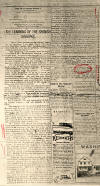
|
3.
22 June 1929.
The Bluefields Weekly, p. 3.
"THE
LEARNING OF THE SPANISH LANGUAGE.
¶ Since I have returned to the old and
familiar surroundings, I am more firmly
convinced that Bluefields, at this time
standing upon the threshold of a new
day, in political, economical and
educational progress,---“ ¶ The
foregoing is an excerpt from an article
contributed by a Bluefieldian, which we
publish in this issue. So great is the
interrelation between political
advancement, economical betterment, and
educational progress, that it is well
nigh impossible to deal exhaustively
with any one phase of the question
without treating the others in detail. ¶
We wish to make a few remarks with
reference to the study of the Spanish
language. Reflection will convince
anyone that in this country, to deal
with the subject from one point of view
would result in the production of an
argument or an article which would be
unbalanced, and which could be
incomplete. Anyone here who gives
consideration to the study of the
Spanish language from one standpoint
only would certainly have a hard task in
vindicating himself on the charge of
being somewhat narrow-minded. ¶ We have
seen in our last issue that the
Government is expecting to undertake an
extensive programme in connection with
education, as well as in other respects.
We announced that the Government School
at Cotton Tree would be re-opened, and
(- - - - - ) and we ( - - - - - -) the
opportunity of having their children
instructed in the Spanish language. ¶ We
would also take this opportunity of
making further comment in our remarks of
last week. ¶ The majority of the Creoles
here speak Spanish. But how well do many
of them speak it? To what extent are
they able to write it? With what degree
of accuracy can they express themselves
which bear a great deal of similarity to
each other, but between which there are
many subtle distinctions? Yes, many of
the Creoles speak Spanish, but very few
of them have made a study of it. ¶ We
believe that one of the reasons for the
estrangement between the Costeños and
the inhabitants of the Interior is the
fact that each party is unacquainted
with the language of the other. The
inhabitants of the Interior do not speak
English. Communication may be, and is
made through the medium of the Spanish
language, but such communication, on the
whole, is one that (- - - - - -) of the
translation of thoughts in a literal and
(- - - - - ) and not in a sense that
penetrates to the very thought and idiom
of the language. It must not for a
moment be considered that language is
the sole difficulty in the way. There
are many others. Not until the two faces
have been found into the another and
this is a matter of several years will
the differences disappear. History will
bear out this statement. This, however,
is a digression. ¶ There are several
vacancies on the staff of the
educational establishments that are
shortly to be opened, vacancies that are
open to Creoles. Positions which will be
given to them, if they are able, not
solely to speak Spanish, but to speak
and write it grammatically. How many
will be able to step into these
positions? ¶ Is it reasonable to expect
that we can enter into the intricacies
of our political life if we are not well
versed in the language in which our
politics are conducted? We may be
patriotic, we may have the best of
intentions, but is the opinion which we
could give now in political matters be
good as it would be if we had a better
knowledge of Spanish? ¶ At school we may
be able to acquire a general view of the
economic situation of or country, but
the person who desires to get to the
bottom of things, who wishes to pry into
every detail, the man who is to be an
asset to Nicaragua in the future as an
economist, must have a thorough
knowledge of the Spanish language. ¶ And
what of the educational standpoint? How
much has that man lost who can
understand language when it is spoken on
the street and what can make himself
understood, but who has not educated
himself to appreciate the rhetorical (-
- - ) of the different figures of speech
and to enjoy the nuances offered for his
intellectual pleasure? How much has he
lost who cannot delight in the musings
of the philosophers of his own country?
How illiberal in his views must he be
who cannot by reading the history of his
compatriots—separated from him by
perhaps 170 miles, a difference of
culture and a difference in
training,--get to know something of
their ways of thinking, their philosophy
of life, and thus make allowances for
what may to the uninformed appear as
striking eccentricities? ¶ One never
knows too many languages, nor is his
education complete unless he understands
and speaks several tongues. When one
leaves his own country to travel abroad
he will find how necessary it is to
understand the language of the country
he visits”. ¶ Self-interest, which is
the strongest motive of human action,
would suggest that we Creoles should not
wait for our Spanish-speaking brothers
to learn English, but we should learn
Spanish, and move forward to assist them
in the noble task of steering Nicaragua
upward to the fulfillment of her noble
destiny."
|
|
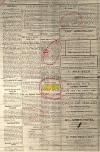
|
29 June
1929.
The Bluefields Weekly.
"RE THE NATIONAL
GUARD ¶ On Monday morning Private Wilson
arrived from Rio Grande with four Creole
recruits for the Guard. He returned on
Tuesday on board the Cuyamel Fruit
Company’s Power Barge. ¶ Lieut. Medley
has returned to Rama and relieved Lieut.
Stone who has come back to resume his
regular duties at the Bluff. ¶ The
latest weekly reports from La Cruz and
Rama indicate that the Guard is
performing its duties efficiently and
that no unpleasant situations are
arising in its dealings with the
civilian population. The Political
situation is quiet: there have been no
military operations, nor has there been
any friction between the law officers
and the public. The attitude of the
public towards the Guard is a favourable
one. ¶ Economic conditions at la Cruz
are at a low ebb. There is however work
for labourers. The farmers are cutting
more fruit than the Companies can
handle. ¶ GLEANINGS FROM PUERTO CAB EZAS
¶ Guardia National at this Port. ¶ We
note with sincere pleasure undeniable
correctness observed by Guardia Nacional
in our neighborhood, conforming to the
enviable ethics of justice and good
order, for which it has been
established. For this brilliant success
we foster but kind regards for its Chief
the Jovial Major H. D. Linscott who
through his energetic efforts and ever
present zeal has reached the aspired
object. Efficiency. Constant drilling is
prevalent at Guardia’s bivouac and
surroundings, where today 46 enrolled
men are being disciplined for the
benefit of public order. ¶ UNIQUE
ADMINISTRATION AS COMANDANTE ¶ In the
interest of the common welfare of this
busy port, we frequently visit the
Comandancia to gain information from
which we have drawn conclusions of the
irreproachable bearing of the esteemed
Lieut. C. R. Darrah of Springfield,
Illinois. For him and for his amiable
wife, señora de Darrah, a Latin-American
daughter of Santo Domingo in the
charming Isle of Haiti, we extend
cordial expression of friendship and
good will. ¶ MILITARY FUNERAL ¶ Carlos
Balentine (Mosquito Indian), recently
recruited for service in the Guardia
nacional at this station, died of
pneumonia at Bragman Bluff Lumber
Company’s Hospital. It is worthy to
mention that he was honored with a final
tribute of a military funeral, and
escorted to cemetery by all officers and
men of the Guardia nacional. We can not
conceal the fact that worthier act of
democracy can not be recorded."
|
|
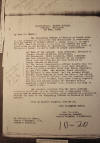
|
29 June
1929.
Letter from Gen.
Dion Williams, Managua, to
US Consul Matthew Hanna, Managua.
|
|
|
|
|
PREVIOUS
NEXT
|
|
|
|
|
|
|
|
